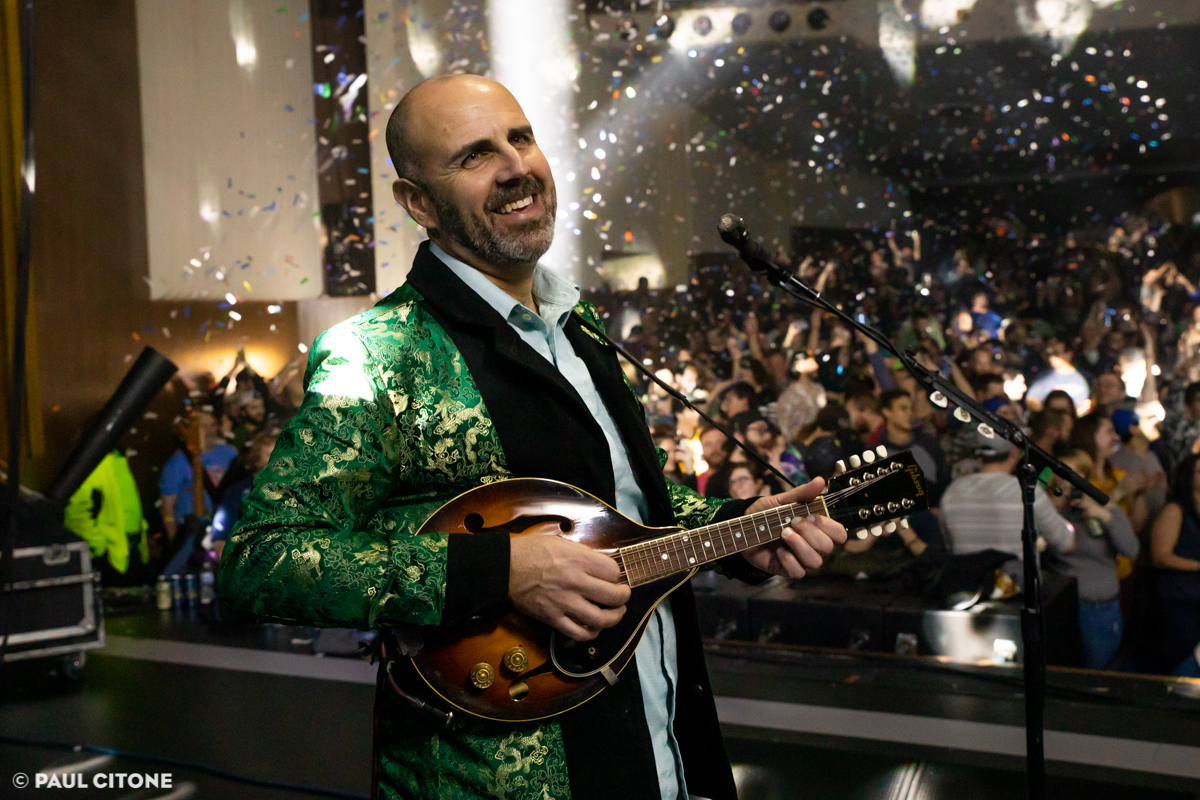The Core: moe.’s Al Schnier

Ahead of his band’s summer tour with Blues Traveler, guitarist Al Schnier looks back at their recent creative renaissance and career reassessment.
Everybody’s Second Set
Blues Traveler were in front of us by a few years, but we had a similar trajectory, coming up through the ranks at places like Nightingale’s and Wetlands. We were following in their footsteps for a while, and then started crossing paths so we have a good rapport—we played together at Red Rocks and John Popper came with us to Bonnaroo [in 2003]. They were the ones who put out the proposal to get together for a summer tour and we loved the idea. Bringing G. Love onboard is the rug that ties the whole room together.
There’s been a lot of discussion about how the collaborative set at the end of the night should work because, if we don’t go out and do two sets then, immediately, our fans get a little bit cranky. So everybody is going to do a set and that last set is going to be “everybody’s second set.”
It’s like putting on a mini-festival every day; we want to do something with a little more intent and quality control than just playing “Not Fade Away” for 45 minutes. It’s fun to have 18 guitar players onstage, but, musically, is it something you are ever going to listen to again?
So we’ve been talking about breaking it down in different ways—maybe having a duo like John Popper and Chuck Garvey out there for a song or just having the guitar players for a bit. Everything is on the table, but we want to make sure there’s a reason for it and that we’re not just playing “Johnny B. Goode.” When I think back to the half-hour set we played to open Furthur Festival in ‘97,
I remember looking up to all these people who were our heroes and have so much experience like Bobby [Weir], Mickey [Hart], Bruce Hornsby, Hot Tuna, The Black Crowes and Arlo Guthrie. I idolized them, and we got to be part of the collaborative jam at the end of the night, even though we were totally green. I felt like a rookie out there—like that new kid. I was shaking in my boots, and they were totally at ease and professional. And the funny thing is: It probably took me 20 years to get to the point where I’m at ease, at least around those guys. I feel that difference now. It comes through putting in the miles. You can’t fake it. There’s something to be said for just doing the work. There’s a certain amount of knowledge that comes from experience and clocking in your 10,000 hours.
Mo Money, moe.down Problems
It took moe.down some time and growing pains to reach this sense of maturity we now feel. And that’s awesome, in a way, because [the festival has] finally come into its own and settled into what it was always intended to be in the first place, which is a festival that is all about moe. and our fans. It got away from us for a little while as things were growing larger—festivals tend to do that as they become more successful. They lose focus of their original intent because the focus becomes how to build something.
moe.down was always supposed to be this great, intimate campout and, at the end of the day, moe. fans want to come and see moe. They want some downtime to hang out with each other and they want to see some other music—and we still want to curate the festival and introduce people to some other bands—but we don’t necessarily want to build moe.down into a Bonnaroo-like event. We’re not trying to attract this huge crowd that may bring an undesirable element into the festival. We’ve found that, while the numbers were getting bigger, the profit margin wasn’t growing. It was the “mo money, mo problems” situation, so we stripped things back. And, we’ve made an effort to bring in all of our side projects and some of the bands that we are affiliated with.
I’ve also been a ski patroller [at Snow Ridge, where the festival is held] for five years and, in that time, I’ve gotten to know so many people on staff who work at the event that I had never met, despite all the years we have been doing moe.down. That was partially my fault, but it also had to do with the way we communicated with management in the past and the way things were run. We didn’t have that connection with the people there that we have now. Things are different. Everybody is more connected to the event and we are much more connected to our business than we have ever been. And that’s been a really good thing for moe. All five of us in the band are much more involved—not only in the day-to-day stuff, but also in all of the work that we do.

The Most Elite Crowd of Comic-Book Nerds
We rotate through who writes our setlists. Recently, Jim [Loughlin] has been taking a bit of a break from it—from time to time, someone will get burned out on it. You feel like you’re not up to the task. So the rest of us rotate on a daily basis. It’s a stressful job; we put a lot of pressure on ourselves because jamband fans can be very demanding when it comes to the setlist. You’ve got fans who are critical of a show simply because of the song choices or the order we play things. It’s like, “Good god.” We could play the most epic version of song “X” and it doesn’t make a difference—it’s just the fact that you chose song “X” and you put it in that slot. You’re dealing with the most elite crowd of comic-book nerds or Facebook statisticians in the world. And I have a lot of respect for those people, which is why we put so much time and energy into doing this.
Regarding the “very special setlist” from our winter tour earlier this year, in which I spelled out “Trump is a lying ass,” it did not occur to me that it would stir up so much controversy. But that’s the nature of things in this day and age. It was naïve on my part, but the setlist was not intended to be overtly political. The fact of the matter is: I was just fed up. It was one
of those days when he was just blatantly lying—I can’t even remember about what at this point because it’s happened so many times since then! I just feel like we all deserve better, and it doesn’t make a difference whether you’re on the left or the right. We should hold our politicians to a higher standard.
One of the things that I have found is that music fans are either really OK with musicians singing about those types of things or they’re really not OK with it, and they want to put you into a box where you’re only allowed to sing about love, rain, rock-and-roll and maybe drugs. They don’t even want you to have an opinion about politics. And, it’s kind of fucked up that I can have an opinion about a basketball team, but I can’t tweet about the news. I can sing about death and tragedy, but not this one thing.
Good Problems to Have
We are confidently working toward a new album. Everything is on the table at this point, which is cool. We’ve been writing a ton of songs, many of which we haven’t even played yet. We want the songs to get their legs under them until they really feel right. Certain songs just need that. They change a little bit with time, too. You play something for a while, and there’s a part that just doesn’t sit right with you—it takes hearing it a number of times for you to figure out what the problem is. Sometimes, it means cutting that part out—somebody in the band will hear it and go, “I have an idea. Your part sucks.”
And at the same time, we’ve been trying to get a lot of older material up and running and trying to incorporate those songs into our shows. Everybody who’s writing our setlists has been creative in that regard, saying, “Hey, what if we do this song a little bit different?” So the shows have been really fresh and awesome. Rob [Derhak] commented recently that he feels like we have too much material.
Our soundchecks, typically, are about two hours, so we rehearse two hours every day before we play our three-and-a-half-hour show. And those two hours are usually spent going through new material, relearning old songs and picking up covers, not just making sure the equipment sounds OK. When Rob first came back [after being diagnosed with cancer], he asked, “Can we not do the two-hour soundcheck? I really feel like my voice isn’t quite up to it.” We said, “Of course. We’ll write easier setlists or whatever,” and we started doing hour-and-a-half soundchecks. And, now, we’re already back to two-hour soundchecks again. But we’ve talked about just picking a chunk of tunes to focus on during a tour instead of the whole song list because it seems like we are choosing from an overwhelming catalog. It’s a good problem to have.
Bigger Perspectives
[When the band came back from a hiatus following Derhak’s health scare], there was no mandate to change our workload or to do anything differently in terms of our approach. But I will say that Rob’s attitude was decidedly different when he came back, and you could tell that there was a sense of gratitude that can only come from an experience like what he went through. There’s also this other, new perspective that he’s been able to bring to the band—this bigger perspective that really helps us move forward creatively, and in terms of our business decisions. It’s been contagious throughout our entire organization. He’ll tell you that the last 18 months or so have been the best working months of our 30 years together.
We recently had a 10-day writing session, and it is unusual for us to go through that without hitting some kind of snag, but it was seamless. Some of that comes with age and some of it comes from working with the same guys for so many years, but we’ve hit this stride now where we all get along well and we all have a good workflow. There’s a greater sense of teamwork throughout our organization right now that’s pervasive, and Rob has a lot to do with that. It’s awesome.
This article originally runs in the June 2019 issue of Relix. For more features, interviews, album reviews and more, subscribe here.



















